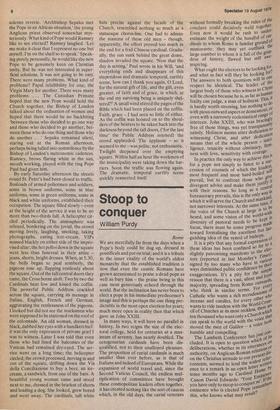Stoop to conquer
William Purdy
Rome We are mercifully far from the days when a Pope's body could be dug up, dressed in pontificals and put on trial; and it is a tribute to the inner vitality of the world's oldest monarchy that the established tradition is now that even the caustic Romans have grown accustomed to praise a dead pope as well as bury him — the praise being in this case most generously echoed through the world. But the inclination has never been to elect a pope in his immediate predecessor's image and this is perhaps the one thing predictable in the most open election for years; much more open in reality then that which gave us John XXIII.
In many ways, it will have no parallel in history. In two reigns the size of the electoral college, held for centuries at a maximum of seventy, has nearly doubled. The octogenarian cardinals have been disqualified, not to their unalloyed pleasure. The proportion of curial cardinals is much smaller than ever before, as is that of Italians and indeed of Europeans. While the expansion of world travel and, since the Second Vatican Council, the endless multiplication of committees have brought these cosmopolitan leaders often together, it has created nothing like the sort of caucus which, in the old days, the curial veterans
Spectator 19 August 1978 without formally breaking the rules of the conclave could decisively weld together. Even now it would be rash to underestimate the weight of the handful of cardinals to whom Rome is familar ground of manoeuvre: they may yet outflank the large number to whom it is full of the grandeur of history, flawed but still aweinspiring. What ought the electors to be looking for and what in fact will they be looking for The answers to both questions will in one respect be identical. The leader of the largest body of those who witness to Christ will be chosen because he is, as far as human frailty can judge, a man of holiness. This, It is hardly worth stressing, has nothing w d° with pious outward aspect or demeanour, er, even with a narrowly ecclesiastical range interests. John XXIII, who was bracingq free of those things, was yet transparently saintly. Holiness means utter dedication to witnessing Christ, and utter dedication means that of the whole person — ligence, tenacity without obstinacy, WIness with love, sensitivity with courage' In practice the only way to achieve this is for a pope not simply to listen to a succession of counsels of which the loudest most frequent and most hard-boiled will prevail, but to confront those whogivet divergent advice and make them jastifY „11 with their reasons. So long as a cenli,' bureaucracy prevails, this is the only wayd which it will serve the Church and plank' if not narrower interests. At the same tiwe't, the voice of the Church at large is to heard, and some vision of the worlddiversity of pastoral needs to be kePt tie focus, there must be some progress ula toward formalising the excellent but lawguishing idea of the synod of bishops. majority, spreading from Rome ounvar tv
ssio0 0_1 It is a pity that any formal expre
these ideas has been confined so far to:. slightly patronising manifesto to the eled, tors (reported in last Monday's riffle:1;s signed by too many who have in var'noit ways diminished public confidence by their ways
ssio0 0_1 It is a pity that any formal expre
these ideas has been confined so far to:. slightly patronising manifesto to the eled, tors (reported in last Monday's riffle:1;s signed by too many who have in var'noit ways diminished public confidence by their ways It's a pity for the siniPat reason that there is a vast, silent and Is, who think in similar terms. For e'ie re of Catholic who wants a rich recrudescen— who incense and candles, for every other vi wcila on ftsct ohurr icdheetsanatdietsminwoistht rtehcekiWesso,r1tbd gburlictei ten thousand who want only a Church' w that can speak to the world with the voice both hmuomvebdietahnedmceonmpeoflGlinagli.lee — a voice The Lambeth Conference has 11115,tocfOillr's eluded. It is open to question wituc'' deliberations, whether in its utterance__ or authority, on Anglican-Roman relannli'dison the Christian attitude to our presentref contents, seemed to lend the wi--Api r wen ence to a remark in an open letter wre by some months ago to Cardinal Hinti,eace Canon David Edwards: 'Your Eunf the you have only to stoop to conquer Ils eaters eminence who is elected Pope relne this, who knows what may result'?


































 Previous page
Previous page